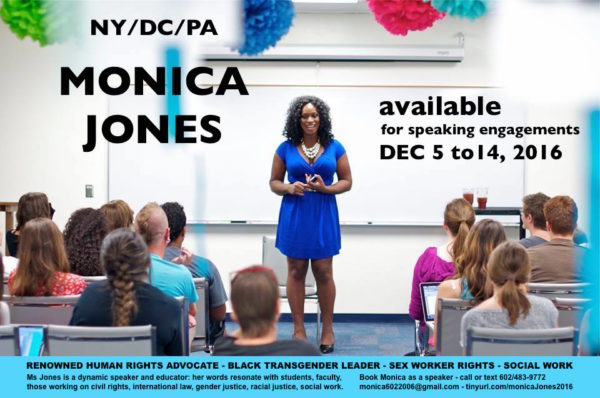On September 7th of this year, UN Women distributed an email with the subject line: “Consultation Seeking Views for UN Women.” In the text of the email, UN Women sought comments for a forthcoming policy on sex work. Sex worker rights and other advocates raised multiple concerns with UN Women’s process and its proposal to draft another U.N. agency policy on sex work. They pointed out that UN Women failed to conduct in-person regional and national consultations for its process, opting instead for a brief, month-long online comment period that will exclude countless voices of directly impacted people. The questions UN Women asks sex workers and others to answer in order to participate in the consultation reference bureaucratic UN language and processes without providing adequate explanation.
Prior engagement by relevant UN agencies on this issue, including UNAIDS, has involved meaningful, lengthy sex worker consultation processes and arrived at policies that uphold human rights protections for sex workers and people engaged in sex trades. UN Women, as a cosponsor of UNAIDS, therefore already has a position supporting decriminalizing sex work as part of a broader agenda of human rights protections for sex workers. While the framing of its consultation process appears directed at fully reconsidering these questions, advocates pointed out that it is the existing policy that must be UN Women’s minimum standard and guide for any further elaboration of its approach to sex work. In addition, Best Practices Policy Project expressed its alarm to UN Women at the fact that the Policy Director in charge of UN Women’s process, Purna Sen, has publicly indicated her belief that sex work should be abolished, and cannot therefore be said to support human rights for sex workers.
UN women sent an email on Oct. 17 to policy advocates stating, “UN Women has heard the calls for an extended period of consulting time.” The email announced a deadline extension of two weeks for submissions. This deadline extension does not represent a genuine effort on the part of UN Women to create a truly consultative process. Two weeks is an inadequate amount of time to resolve the issues that advocates raised, including the lack of in-person local and regional consultations, the lack of engagement of sex workers in shaping the process to begin with, the lack of transparency in its process, and UN Women’s failure to look to current UN agency policies on the issue as a minimum standard and guide. Without addressing these foundational issues, UN Women’s process is still illegitimate and may do more to harm human rights protections than to assert them. By responding to calls for transparency and meaningful in-person consultations with a simple fifteen-day extension, UN Women is sending the message that communities that face discrimination don’t need to be meaningfully consulted—that UN agency officials and resource-rich NGOs can simply represent them. Ignoring the feminist principle of meaningful consultation with groups most impacted by an issue at hand sets a deeply harmful precedent and example for the broader UN community, and it must not be allowed to continue.
The Network of Sex Work Projects (NSWP) is continuing to call for signatories to their petition to put pressure on UN Women about the process. The petition is available in 5 language (English, Spanish, French, Chinese, and Russian) here: https://action.manifesta.net/efforts/call-for-un-women-to-meaningfully-consult-sex-workers
The NSWP is also encouraging those concerned about the process to highlight the issues in social media. The Best Practices Policy Project supports these actions and encourages all our allies to continue speaking out on the issues.
Sample tweets:
We have signed this submission to @UN_Women with 86 orgs for their consultation on #sexwork http://tinyurl.com/zf62zxx #sexworkiswork
We are one of 86 signatories of this letter to @UN_Women with #sexwork-ers and allies http://tinyurl.com/zf62zxx
We ask @UN_Women to meaningfully include #sexwork-ers in the development of their policy on sex work http://tinyurl.com/zf62zxx
Please sign the @GlobalSexWork petition. @UN_Women, meaningfully include sex workers in policy development! http://tinyurl.com/gmp3hqe
We support the human rights of #sexwork-ers and have signed this @UN_Women petition http://tinyurl.com/gmp3hqe please sign and share!
Sample Facebook messages:
We co-authored this submission to UN Women with 86 sex workers’ rights and women’s rights organisations. We are calling on UN Women to engage in a meaningful consultation with sex workers in the development of their policy on sex work. http://www.creaworld.org/announcements/response-un-women-s-call-consultation-seeking-views-un-women-approach-sex-work-sex
Please sign and share the Global Network of Sex Work Projects’ Petition. They are petitioning UN Women to engage in a meaningful consultation with sex workers as they develop their policy on sex work. https://action.manifesta.net/petitions/call-for-un-women-to-meaningfully-consult-sex-workers-as-they-develop-policy-on-sex-work?preferred_locale=en
Please sign and share this NSWP petition. They are urging UN Women to adopt a rights affirming approach to sex workers’ rights and to consult with sex workers in the development of their policy on sex work. https://action.manifesta.net/petitions/call-for-un-women-to-meaningfully-consult-sex-workers-as-they-develop-policy-on-sex-work?preferred_locale=en


 Sharmus Outlaw our colleague and friend has passed away this morning remaining strong and powerful in her beliefs through her last days.
Sharmus Outlaw our colleague and friend has passed away this morning remaining strong and powerful in her beliefs through her last days.